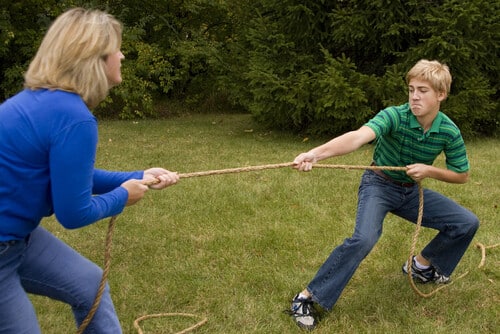Eliminating Power Struggles with Children – by Lori Ramsey
Busy families often meet strife when trying to get through the day. Even after planning and scheduling the daily events moments of power struggles often escalate into full-blown arguments. Parents lead the way through example and remaining calm and in control are paramount to keeping the power struggles at bay. Sometimes you simply must pick and choose your battles and understand when it’s right to go head-to-head and when to back down and compromise.
Empathy is a great place to start, and empathy requires patience with the parent. Empathy starts by respecting our children’s feelings. If an argument is about to ensue, pause a moment and try to place yourself in your child’s shoes. Is this happening for a reason other than the child is just being a brat? It’s easy for us to lose control and think our kid as being difficult when there may well be an underlying reason for the behavior. If you pause and place yourself in your child’s shoes you may understand why they show the need to argue.
Start with asking why the child won’t do as asked. Perhaps there’s discomfort. Example, if you ask your child to wash the dishes and they whine and say no, ask them why. Maybe they have a cut on their hand or extra dry skin. Or perhaps the child doesn’t want to wash the dishes or if the chore is so boring they don’t want to do it. But by asking them why not, or if they have a reason they shouldn’t (and say it in a way that shows true empathy.) Offer a solution why they should follow through without arguing or whining? But let them know you listen to their concerns. Direct with patience and calm. Offer solutions. “If you wash the dishes now, you’ll have more time to play on the game system.” “Wear this pair of gloves to protect your hands.”
When you tell a child to do something try to word your responses without making the child feel as if you are negating your response. Children are sponges and still learning about the world. When you tell a child to do something, normally the task is something that will help them to learn how to deal with their environment, (such a making their bed and cleaning up their room.) If they argue and you negate the response by adding a “but” in the sentence, you are negating your words. Instead of saying, “but” word the response with the reason. “I understand you don’t want to clean your room but if you don’t, you’ll be grounded.” That’s a negative statement. Instead word the request like this, “I know you don’t want to clean your room. You need to realize; a neat clean room helps you to rest better and you’ll be able to get ready for school quicker because you’ll be able to find your clothing and school books quicker.” Do you see the difference? Instead of a negative statement and punishment, you’re giving a positive reason to do what they are told. If they still won’t do it, you can add an end statement. “If you don’t clean your room and keep the room neat, you will be grounded from the game system for a week.” Offer the positive words and behold how that works, then tell the consequences if they still won’t listen to you.
Children respond well when we take the time to explain why we ask them to do something. Barking orders because we’re busy and there’s no time to explain is not a good excuse. If you want your child to learn to obey you, then you need to offer an explanation other than, “Because I told you so.” That’s a cop out statement and children will grow up not taking you seriously. If you tell them to do something, tell them why. Give the command followed by the reason. Example, “Please get dressed. We are leaving for school in half an hour.”
Saying no to children all the time gives them a false sense of negative. If your child asks for something or asks to do something and you can’t for whatever reason, try not to say no unless it’s a no response forever. For example, say the child asks if they can play on the game system, but they have homework and they haven’t done their chores yet – don’t say, “No. Not until you finish homework… do your chores.” Instead make the statement a positive statement by saying, “Yes, you may play on the game system after you finish your homework… or after you’ve taken out the trash… wash the dishes…” whatever they must do first. The yes answers, even though it means they can’t do or have that thing right way diffuses arguments.
If you experience trouble getting your child to do chores, or their homework, try to engage their imaginations when doing their tasks. If they need to wash dishes, put on music and make it into an enjoyable task. Offer rewards such as a dessert or an extra few minutes of game playing or television watching. “When you finish your homework, you can have an extra 15 minutes on the PS4.” Try to make their chores and daily tasks enjoyable.














Add Comment